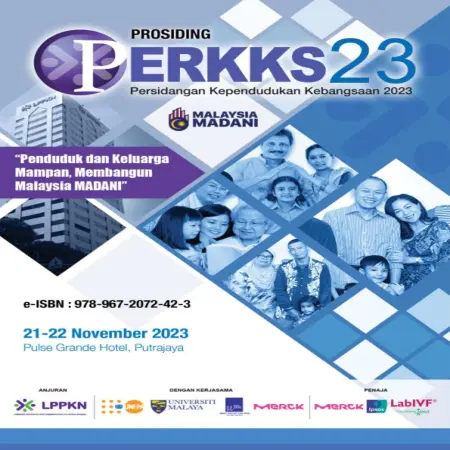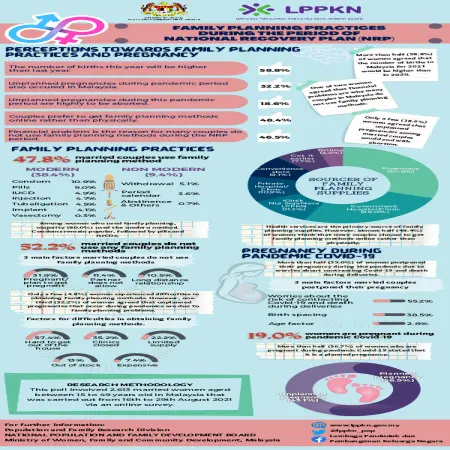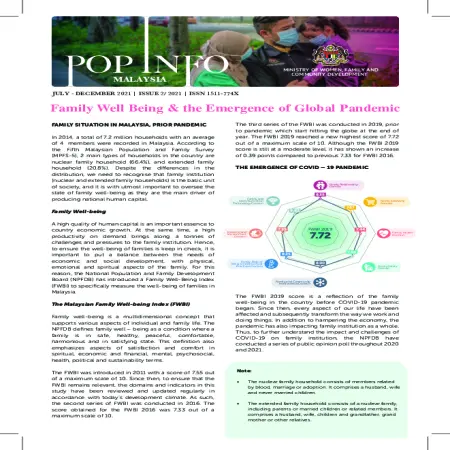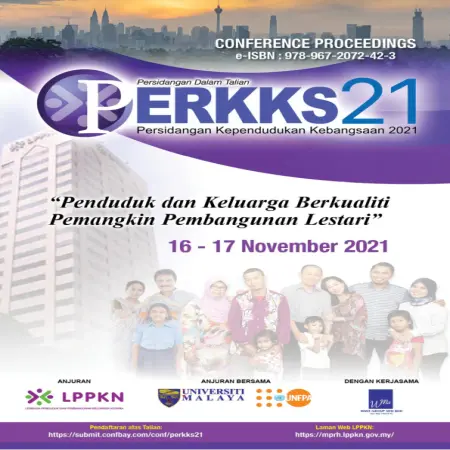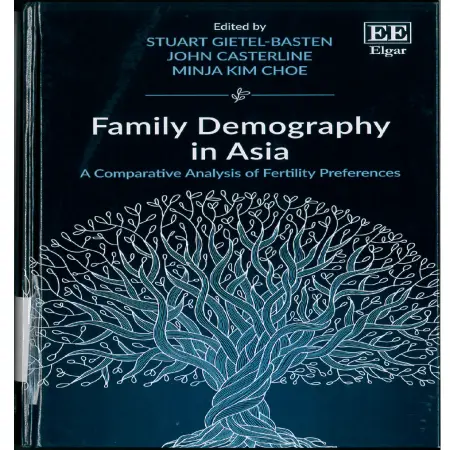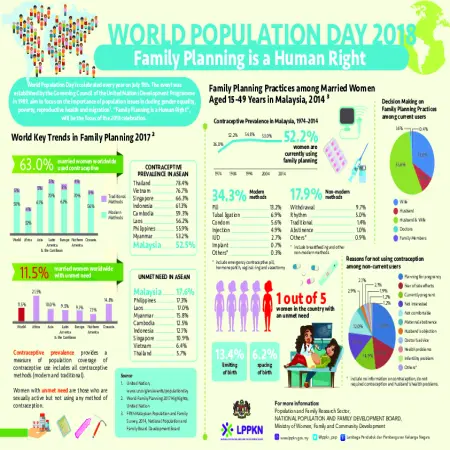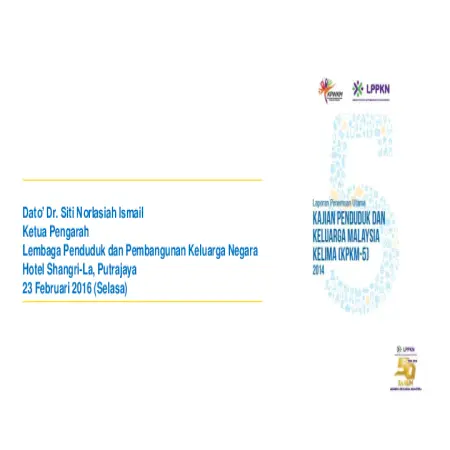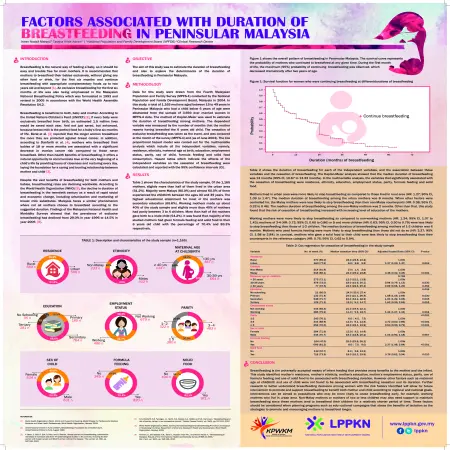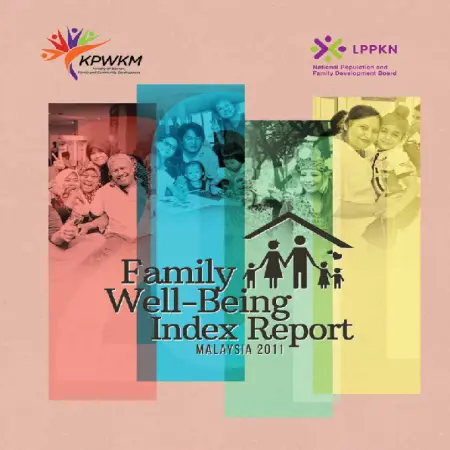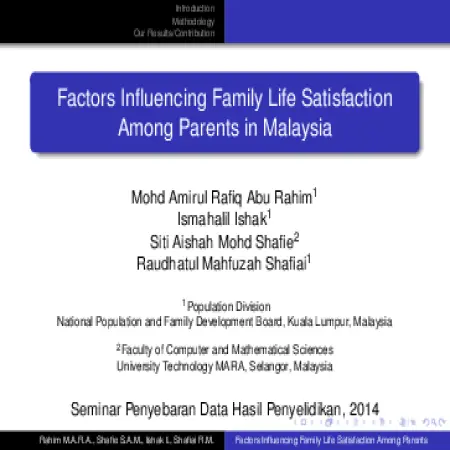Browse by Division/Agency
Results for Division/Agency : "LPPKN - National Population and Family Development Board, Malaysia: Population and Family Research Division"
|
|
Faktor kritikal mendepani isu dan cabaran tenaga kerja menua
Item Type: Book Section
Editor:
Year: 00/01/2024
Abstract: An aging workforce is one of the few phenomena faced by countries experiencing an aging population. This is also the case in Malaysia which has been categorized as an aging country by the World Bank since 2020. The aging workforce poses a number of issues and challenges to policy makers, employers and employees, especially those who are going through the aging process themselves.
|
|
|
|
|
|
Family well being & the emergence of global pandemic
Item Type: Newsletter
Editor:
Year: 00/00/2021
Abstract: National Population and Family Development Board (NPFDB) has introduced a Family Well-Being Index (FWBI) to specifically measure the well-being of families in Malaysia. The third series of the FWBI was conducted in 2019, prior to pandemic which start hitting the globe at the end of year. The FWBI 2019 reached a new highest score of 7.72 out of a maximum scale of 10. Although the FWBI 2019 score is still at a moderate level, it has shown an increase of 0.39 points compared to previous 7.33 for FWBI 2016. The FWBI 2019 score is a reflection of the family well-being in the country before COVID-19 pandemic began. Since then, every aspect of our life have been aff¬ected and subsequently transform the way we work and doing things. In addition to hampering the economy, the pandemic has also impacting family institution as a whole.
|
|
|
|
|
|
Fatherhood program and children’s development: Does it mature?
Item Type: Book Section
Editor:
Year: 00/00/2021
Abstract: The prevalence of social problems and criminal cases among teenagers in Malaysia is at an alarming level. Often, such problems are associated with the fragility of the family institution underpinned by the role of the father. In Malaysia, fatherhood-related programs are still limited and minimal compared to the United States where most initiatives to support fathers have been implemented through father-specific programs designed to improve fathers' economic self-sufficiency, parenting knowledge and skills.
|
|
|
|
|
|
Fertility preferences in Malaysia
Item Type: Book Section
Editor:
Year: 30/11/2018
Abstract: Most countries have been experiencing changes in fertility pattern over the last few decades. Fertility transition from high to low is a relatively recent phenomenon in Malaysia. The total fertility rate (TFR) had declined from 4.9 children per woman in 1970 to 4.0 in 1980. It has continued to fall and has reached the replacement level of 2.1 in 2010. This chapter provides the trend analysis and a comparative analysis of fertility trends to explain the fertility transition of Malaysia’s population. Data used in this study were obtained from Department of Statistics, Malaysia and Fifth Malaysian Population and Family Survey, 2014. The result of this study showed that the fertility rate between age groups was higher among Malay than other ethnics since 1991–2010. Across all ages, the fertility rate has a negative correlation with the educational level where women with tertiary education tend to have fewer children compared to less educated women. This study also presents the fertility desire in Malaysia. There is a negative correlation between age group and fertility desire. In addition, the desire to stop childbearing is found to be stronger when women have had three living children. The findings of this study will help policy makers to plan programmes to improve the fertility rate in Malaysia.
|
|
|
|
|
|
Family planning is a human right
Item Type: Infographic
Editor:
Year: 00/07/2018
Abstract: World Population Day is celebrated every year on July 11th. The event was established by the Governing Council of the United Nations Development Programme in 1989, aim to focus on the importance of population issues including gender equality, poverty, reproductive health and migration. Family Planning is a Human Right, will be the focus of the 2018 celebration.
|
|
|
|
|
|
Factors associated with duration of breastfeeding in Peninsular Malaysia
Item Type: Scientific Poster
Editor:
Year: 00/00/2015
Abstract: Breastfeeding is the natural way of feeding a baby, so it should be easy and trouble free for most mothers. It is recommended that mothers to breastfeed their babies exclusively, without giving any other food or drink, for the first six months and continue breastfeeding with appropriate complementary foods up to two years old and beyond [1]. An exclusive breastfeeding for the first six months of life was also being emphasized in the Malaysian National Breastfeeding Policy which was formulated in 1993 and revised in 2005 in accordance with the World Health Assembly Resolution 54.2. Breastfeeding is beneficial to both, baby and mother. According to the United Nations Children’s Fund (UNICEF) [2], if every baby were exclusively breastfed from birth, an estimated 1.5 million lives would be saved each year. And not just saved, but enhanced, because breast milk is the perfect food for a baby’s first six months of life. Beral et al. [3] reported that the longer women breastfeed the more they are protected against breast cancer. In addition, according to Danforth et al. [4], mothers who breastfeed their babies of 18 or more months are associated with a significant decrease in ovarian cancer risk compared to those never breastfeed. Other than health benefits of breastfeeding, it offers a natural opportunity to communicate love at the very beginning of a child’s life by providing hours of closeness and nurturing every day, laying the foundation for a caring and trusting relationship between mother and child [2]. Despite the vast benefits of breastfeeding for both mothers and babies, breastfeeding rates are declining worldwide. According to the World Health Organization (WHO) [5], the decline in duration of breastfeeding in the twentieth century as a result of rapid social and economic change, including urbanization and marketing of breast milk substitutes. Malaysia faces a similar phenomenon where not all mothers choose to breastfeed according to the suggested duration. Findings of the Malaysian National Health and Morbidity Surveys showed that the prevalence of exclusive breastfeeding had declined from 29.0 % in year 1996 to 14.5 % in year 2006 [6]. Objective: The aim of this study was to estimate the duration of breastfeeding and also to explore the determinants of the duration of breastfeeding in Peninsular Malaysia.
|
|
|
|
|
|
Family Well-Being Index Report Malaysia 2011
Item Type: Research Report
Editor:
Year: 00/00/2015
Abstract: In the past few decades, Malaysia has and is still undergoing a process of rapid social and economic development. This is a result of policies implemented by the government such as the New Development Policy (1991-2000), National Vision Policy (2001-2010) and Government Transformation Programme (2010-2020) which all aim to transform Malaysia into a developed and competitive country. However, the processes has imposed increased demands on the family institution because of the responsibilities and the challenges faced by the family
itself. The family institution must be strengthened to offset the rapid process of social and economic development. This is important because family is the basic social unit which prepares and supplies human capital resources for national development. Given the importance of family well-being to the future of the country, a scientific study needs to be conducted to measure the level of well-being of families in Malaysia. Measuring family well-being is crucial as it can indirectly measure the impact of the implementation of national social and economic development policies on families and the extent to which the implemented policies and programmes are successful or otherwise. Hence, this study has identified suitable indicators that can provide
information about the well-being of families in Malaysia. Subsequently,
based on the identified indicators, a Family Well-Being Index (FWI) was
developed to measure the current well-being of the family as well as
to be used in policy formulation, planning for implementation of future
research, the development of new programmes and services, and
expansion of the existing programmes.
|
|
|
|
|
|
Factors influencing family life satisfaction among parents in Malaysia
Item Type: Conference or Workshop Item
Editor:
Year: 00/00/2014
Abstract: The study attempts to investigate the factors that influence family life satisfaction (FLS) among parents in Malaysia. The study modeled the variable of parental involvement, family functioning, family resilience and time with family as independent constructs. Data for the study was gathered from nationally representative survey of “Family Well-Being Index” study conducted by National Population and Family Development Board Malaysia. Response from 2808 sampled households which involved about 1484 (52.8%) fathers and 1324 (47.2%) mothers of having a child aged at least 13 years old were utilized for the purpose of the current study. A Structural Equation Modeling (SEM) was employed by using Analysis of Moment Structure (AMOS) software. The study found all the modeled independent constructs tested had a significant and direct influence on family life satisfaction among the respondents except for parental involvement construct.
|
|
|
|





